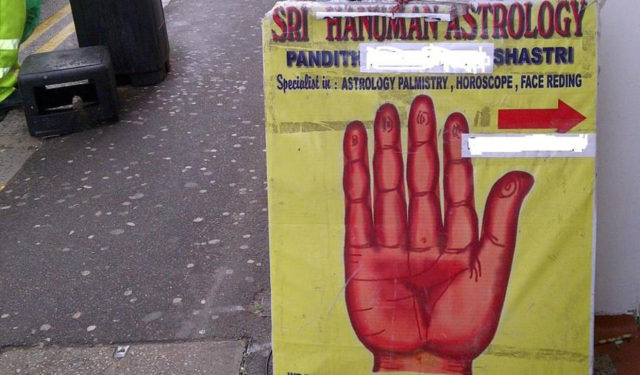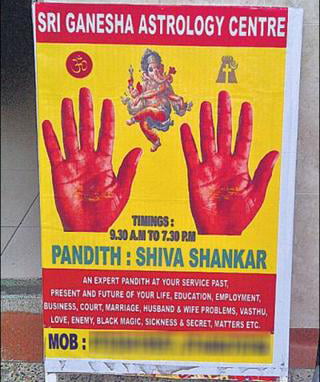Police in Leicester in the east Midlands, UK, home to a large minority of Indian origin, have cautioned the community against using the services of ‘babas’, bogus faith healers and ‘tantriks’, who promise love, luck, and lucre for a price.
Many people have fallen prey, parting with thousands of pounds without any results. One healer, who called himself “Kamal-ji” and conned many in the UK, the US, and Canada, was jailed last year, and another faced the same fate last week.
Leicester police official Adam Makepeace, who has dealt with such cases and secured convictions, said, “The practice of spiritual healers is one that goes back many years and is mainly associated with the Asian subcontinent and Africa. These individuals are known to advertise their services within those communities.
“These people are committing fraud and we would encourage anyone approached in these circumstances to contact the authorities. The aim of the campaign was to educate communities and raise awareness that these people can’t perform miracles and no one should contact them or recommend their services.”

Last year, the nine-year prison term of Kamal-ji, whose real name is Mohammed Ashrafi, was extended by five years because he failed to pay back £613,500 conned from his victims. He reportedly owns property in India.
The ‘baba industry’ in Britain is estimated to be worth £40 million annually.
If an NRI in the UK were to pick up any newspaper published there in Indian languages or switch on any ‘ethnic’ television channel, he is likely to be greeted by adverts on ‘babas’, mystics and astrologers, promising a magical cure for ailments and ‘removing curses’, among other attractions.
Anasudhin Azeez, the Indian-origin editor of Asian Lite, a leading British Asian publication, said as a matter of policy, his newspaper refuses to carry such adverts but he continues to be approached by insistent ‘babas’ seeking to advertise in his publication.
“Every week, we get at least three phone calls from ‘babas’ who want to advertise. They are ready to pay whatever the charge in the rate card. Since we never carry such adverts, we often get threats in the form of parcels containing ashes, hair, eggshells, threads, lemons and small metal bits scribbled with ‘shlokas’, but it all goes straight into the bin,” he added.

Many such babas travel to the UK from India and other parts of south Asia for a brief period, offer their ‘services’ to the superstitious in the community in exchange for a fee, and return home. Most victims do not complain to authorities after realising they have been conned.
News of godmen turning out to be con men should not surprise us. What should surprise us instead is the eager readiness of individuals, even highly educated ones, to surrender themselves to tantriks – the conmen of religion. Where have we misplaced our capacity for righteous indignation?
Sanal Edamaruku, head of the Indian Rationalist Association in Chennai, has remarked, “There is a popular misconception that superstition only exists in rural India, but superstition is thriving in well-educated, urban middle-class families as well.”
If you think about it, modern life may even be contributing to the phenomenon. Few urban Indians have the time to do long pujas or go on pilgrimages anymore. So, to tackle the competition for good jobs and seats at India’s leading universities, many superstitious people rely on the services of private tantriks or a numerologist to give them an edge.

Something similar is happening with the Indian communities living abroad. Is it the case of distance making the heart grow fonder? Perhaps. It isn’t uncommon for people living away from their country to crave for the “Indian touch” and way of life.
But, surely, staying in touch with your roots does not mean turning to blind faith and superstitions?
Sachdev Virdee, general secretary of the Birmingham-based Asian Rationalist Society of Britain (ARSB), said tantriks, witch doctors, and charlatans were exploiting the superstitious and gullible people from Indian, south Asian and Afro-Caribbean communities and were earning hundreds of thousands of pounds every year. The babas are known to charge £500 for a 10-minute session.
Virdee said awareness was slowly growing in the British Indian community about such babas, but regretted that many of them continued to operate openly.
For several years the ARSB had offered £100,000 to any babas or tantriks who could scientifically prove ‘miracles’. Interestingly, the challenge is yet to be taken up.
The real challenge, however, is to eradicate superstition from our community.
When will we, as Indians, learn to assume responsibility for our lives instead of falling back on blind faith?
Image Source: Google
Would you like to share your opinion and discuss more on the matter? Then add us on Snapchat and we could hit up an interesting conversation. Click the link below to add Economy Decoded on Snapchat.
ED – The Youth Blog on Snapchat
If you liked this, you might also be interested in:
http://edtimes.in/2016/05/nuisance-that-indians-create-in-the-name-of-hinduism/






























